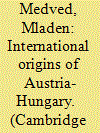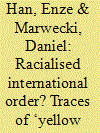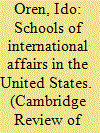|
|
|
Sort Order |
|
|
|
Items / Page
|
|
|
|
|
|
|
| Srl | Item |
| 1 |
ID:
191677


|
|
|
|
|
| Summary/Abstract |
Counter-interventions have often been employed to promote specific political or economic interests. Using the morality of counter-intervention as a lens, this article explores Michael Walzer’s counter-intervention theory to interrogate the practicalities of applying his symmetry principle—equivalence when balancing a conflict—in the context of imperfect information. After examining the links between the principles of non-intervention and self-determination and identifying the main tenets of Walzer’s theory, this article demonstrates how the Yemeni conflict exemplifies the problematics of crafting a moral counter-intervention strategy. On the one hand, the longer a country waits to counter-intervene, the harder it becomes to calculate the effects of the previous intervention; on the other hand, the faster a country counter-intervenes, the less informed and symmetric the counter-intervention is likely to be. Consequently, this study concludes that Walzer’s symmetry principle does not successfully indicate when and how counter-intervention should develop.
|
|
|
|
|
|
|
|
|
|
|
|
|
|
|
|
| 2 |
ID:
191674


|
|
|
|
|
| Summary/Abstract |
While the theory of the Chinese School of International Relations (CSIR) has contributed new dimensions to IR such as the concept of relationality into theorisation practice, it also faces the same pitfalls as the schools of thought that precede it: it pays insufficient attention to the relationship between ethics and subjectivity despite its repetitive use of such concepts as ‘morality’ in its articulation of contemporary world affairs and insufficient attention to the ethical dimension of IR that makes this approach prone to dismissing the voices of ‘others’. This ethical problem in CSIR emanates from inadequate consideration of temporality and its relation to ethics. However, introducing the present, or Nikon (而今), an Asian-originating case of temporality based on the Mahāyāna Buddhist ontological ethics, illustrates how this manifestation of Buddhist temporality offers solutions to mitigate the ethical drawback of the Chinese School discourses.
|
|
|
|
|
|
|
|
|
|
|
|
|
|
|
|
| 3 |
ID:
191673


|
|
|
|
|
| Summary/Abstract |
Academic and policy interest in civil society participation in the European Union’s trade policy has been growing since the late 1990s. We analyse civil society’s engagement with the Domestic Advisory Groups (DAGs)—consultation mechanisms established by the European Commission at the implementation stage of its free trade agreements. While the Commission’s formal rationale for the DAGs is partnership with civil society, in fact this relationship involves a marked power and resistance dynamic. We focus on civil society’s agency and resistance, develop a conceptual framework laying out different possible types of resistance, and empirically demonstrate the wealth of both overt and subtle resistance practices employed by DAG members. Most of this resistance is (moderately) comprehensive and directed against the DAGs’ rationalities and technologies. While showing that DAGs are deeply contested, our study also provides a nuanced analysis of resistance with particular attention for divisions between business and non-business members.
|
|
|
|
|
|
|
|
|
|
|
|
|
|
|
|
| 4 |
ID:
191671


|
|
|
|
|
| Summary/Abstract |
This article examines the emergence of Austria-Hungary from the perspective of uneven and combined development (UCD), which unifies social and geopolitical modes of explanation. It argues that UCD can explain the ‘paradoxical’ role of Hungary, a relatively backward society that was at the forefront of the 1848 revolutions and the political reorganisation of the Austrian Empire in 1867. However, it maintains that potentials of UCD have not been realised even in recent UCD interpretations of the Monarchy due to declinist assumptions. The article argues that the international management of UCD via the Concert of Europe inflated Austrian power, but could not prevent sociopolitical change, laying the ground work for its later deflation. The Austrian Empire also faced the challenge of revolutionary Hungary. The article demonstrates that its intersocietally generated peculiarities resulted in the gentry initiating the transition to capitalism to counter the geopolitical threat of industrialising Austria and arrest its social decline. Despite defeating Hungary and introducing capitalist social relations, the strength of Austrian dynasticism prevented the emergence of a hegemonic bloc and political stabilisation. It was this political weakness rather than economic backwardness that might better explain its expulsion from Germany in 1866. The article then turns to a comparison of the political economies of Prussia/Germany and Austria-Hungary and questions the overemphasis on Austro-Hungarian backwardness. By offering a new interpretation of Austria-Hungary, the article contributes to a rethinking of nineteenth century international relations and the long-term causes of World War 1
|
|
|
|
|
|
|
|
|
|
|
|
|
|
|
|
| 5 |
ID:
191675


|
|
|
|
|
| Summary/Abstract |
This article explores how racial prejudice in the West forms at least part of the ideational foundation in how the rise of China has been perceived, and how such racial prejudices to some extent inflate people’s threat perception and hinders acceptance of any future Chinese hegemony. The article focuses on the leading European power, Germany, and provide a discourse analysis of the contemporary German popular media’s portrayal of China, China’s rise and how the vestiges of racial prejudice continue to define the German public’s view of China. It focuses on an analysis of a small yet representative sample of mainstream media and expert literature in Germany, so as to discern how ‘the rise of China’ is discussed in the German public sphere and the persistence of the ‘Yellow Peril’ trope. This article contests that all the elements that make up the perception of the ‘Yellow Peril’ have persisted, albeit in subtler ways. It argues that the more the literature adheres to the idea of a ‘Yellow Peril,’ the more it tends to perceive the international order in terms of a quasi-natural competition between nations. The article argues that as a non-Western non-White nation, China’s rise has been heavily racialised.
|
|
|
|
|
|
|
|
|
|
|
|
|
|
|
|
| 6 |
ID:
191672


|
|
|
|
|
| Summary/Abstract |
Although disciplines are but one element of the institutional matrix of higher education, historians of International Relations (IR) rarely explore the field beyond its disciplinary context. To redress this lacuna, I sketch the history of professional international affairs (IA) schools in the United States. IA schools employ many IR scholars and train numerous practitioners, constituting a crucial interface between the IR academy and the policy world. When the social science disciplines were institutionalised at the turn of the twentieth century, the mission of training IR scholars momentarily eclipsed, but never extinguished, the commitment to training practitioners. During the twentieth century, this commitment increasingly found expression in interdisciplinary professional IA schools. I survey the emergence of IA schools, the growth of terminal master’s programmes within their walls, and the rapid growth of enrollments in these programmes. The expansion of IA education mirrored the spectacular growth of professional education on US campuses in areas such as law, business, nursing, and social work.
|
|
|
|
|
|
|
|
|
|
|
|
|
|
|
|
| 7 |
ID:
191676


|
|
|
|
|
| Summary/Abstract |
The conflict between Russia and the Euro-Atlantic Community has taken the form of a systemic crisis, in which we face the risk of running from incident to incident. It is argued that the European post-Cold War order has undergone a norm-transforming, rather than norm-governed change. The normative framework and shared purpose on which it rests and which are essential to stabilise and perpetuate an international order have been eroded. The crisis is assessed on the basis of both the acts of violation and retreat by key ordering agents and their intersubjective assessment of the order. It is argued that normative pillars have gradually dissolved in four key areas: the principles of the Paris Charter on the indivisibility of security, the arms control regime, collective security and the European border regime. Tackling these issues is particularly complicated, because some, such as arms control, require today a global approach, involving China.
|
|
|
|
|
|
|
|
|
|
|
|
|
|
|
|
|
|
|
|
|